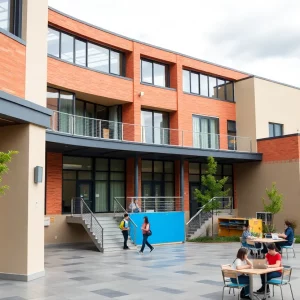Huntsville Residents Voice Environmental Concerns at Federal Advisory Council Meeting
On a sunny October afternoon, the bustling city of Huntsville, Alabama became the center of an important discussion on environmental justice. Residents gathered to express their concerns regarding a proposed quarry and landfill issues affecting their communities during the White House Environmental Justice Advisory Council (WHEJAC) meeting on October 9, 2024.
The venue buzzed with energy as participants shared their heartfelt experiences and worries about detrimental environmental impacts. One particularly passionate voice among them was Cody Gilliam, a pastor at Belle Mina Methodist Church in nearby Limestone County. “A quarry will most certainly pollute the air and the water around these people,” he stated firmly, addressing the concerns of residents living near the proposed site.
Residents of Belle Mina have been actively fighting against the Alabama Department of Environmental Management (ADEM) from granting a permit for the quarry. Their concerns extend to public health, property values, and the potential endangerment of historic sites. Currently, ADEM has not finalized its decision on granting the needed air and water permits, and the Environmental Protection Agency (EPA) is in the process of reviewing the water permit.
The Mission of WHEJAC
Established by the Biden administration through an executive order in 2021, the WHEJAC aims to tackle both current and historical environmental injustices across the nation. The council serves as a vital link between the government and community members, creating a platform for citizens to voice their environmental concerns.
Among those advocating for Huntsville as the meeting’s location was Catherine Flowers, a Lowndes County native and Madison resident, who serves on the council. She noted that these meetings have become essential for the government to hear from diverse communities and recognize the pressing issues at play.
Addressing Food Justice
During the meeting, Ankur Shah, the president of the Huntsville Environmental Coalition, emphasized that one of the council’s priorities should be “food justice.” He highlighted the need for equal access to healthy food and the importance of cultivating healthy soil to support food production. Shah’s remarks were met with nods of agreement from many audience members, who recognized how interconnected these issues are with environmental quality.
Landfill Concerns in Uniontown
Another poignant moment came when Portia Shepherd from Black Belt Women Rising took the floor to discuss the struggles of Uniontown, a small town in central Alabama. Shepherd shared how her own family has been profoundly affected by the nearby landfill and ongoing wastewater management issues. “My family lives near the landfill on my mom’s side, and like many others, they are deeply angry about the damage it has caused,” she expressed, highlighting the emotional toll that environmental issues take on local communities.
As the last WHEJAC meeting of 2024, attendees felt a sense of urgency in amplifying their voices and concerns. Most of the council’s discussions have taken place virtually since its inception, making this in-person gathering all the more special for community members eager to engage with decision-makers directly.
A Call for Action
The enthusiastic atmosphere at the meeting stirred a collective hope among attendees that their concerns would be taken seriously. Many left the room feeling invigorated and committed to continuing the fight for environmental justice in Alabama.
As residents of Huntsville and other impacted areas advocate for their communities, it’s clear that people are ready to stand up for their right to a clean and healthy environment. Whether it’s opposing a quarry or demanding better management of local landfills, Alabamians are passionate about making their voices heard.
The WHEJAC meeting was a vital reminder that environmental issues affect real lives and communities. It was a day of sharing stories, raising awareness, and building the connections needed to advocate for change.








